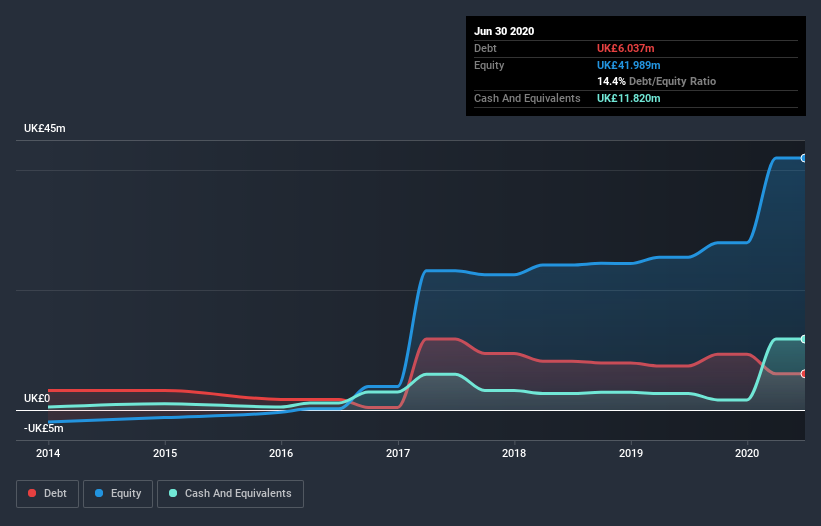Franchise Brands (LON:FRAN) Seems To Use Debt Quite Sensibly

Howard Marks put it nicely when he said that, rather than worrying about share price volatility, 'The possibility of permanent loss is the risk I worry about... and every practical investor I know worries about.' When we think about how risky a company is, we always like to look at its use of debt, since debt overload can lead to ruin. Importantly, Franchise Brands plc (LON:FRAN) does carry debt. But the more important question is: how much risk is that debt creating?
Why Does Debt Bring Risk?
Debt is a tool to help businesses grow, but if a business is incapable of paying off its lenders, then it exists at their mercy. If things get really bad, the lenders can take control of the business. While that is not too common, we often do see indebted companies permanently diluting shareholders because lenders force them to raise capital at a distressed price. By replacing dilution, though, debt can be an extremely good tool for businesses that need capital to invest in growth at high rates of return. The first thing to do when considering how much debt a business uses is to look at its cash and debt together.
See our latest analysis for Franchise Brands
What Is Franchise Brands's Debt?
You can click the graphic below for the historical numbers, but it shows that Franchise Brands had UK£6.04m of debt in June 2020, down from UK£7.34m, one year before. However, its balance sheet shows it holds UK£11.8m in cash, so it actually has UK£5.78m net cash.
How Healthy Is Franchise Brands's Balance Sheet?
According to the last reported balance sheet, Franchise Brands had liabilities of UK£11.5m due within 12 months, and liabilities of UK£11.4m due beyond 12 months. Offsetting this, it had UK£11.8m in cash and UK£13.4m in receivables that were due within 12 months. So it can boast UK£2.37m more liquid assets than total liabilities.
This short term liquidity is a sign that Franchise Brands could probably pay off its debt with ease, as its balance sheet is far from stretched. Simply put, the fact that Franchise Brands has more cash than debt is arguably a good indication that it can manage its debt safely.
But the bad news is that Franchise Brands has seen its EBIT plunge 10% in the last twelve months. If that rate of decline in earnings continues, the company could find itself in a tight spot. When analysing debt levels, the balance sheet is the obvious place to start. But ultimately the future profitability of the business will decide if Franchise Brands can strengthen its balance sheet over time. So if you want to see what the professionals think, you might find this free report on analyst profit forecasts to be interesting.
Finally, while the tax-man may adore accounting profits, lenders only accept cold hard cash. Franchise Brands may have net cash on the balance sheet, but it is still interesting to look at how well the business converts its earnings before interest and tax (EBIT) to free cash flow, because that will influence both its need for, and its capacity to manage debt. During the last three years, Franchise Brands produced sturdy free cash flow equating to 63% of its EBIT, about what we'd expect. This free cash flow puts the company in a good position to pay down debt, when appropriate.
Summing up
While it is always sensible to investigate a company's debt, in this case Franchise Brands has UK£5.78m in net cash and a decent-looking balance sheet. So we are not troubled with Franchise Brands's debt use. The balance sheet is clearly the area to focus on when you are analysing debt. But ultimately, every company can contain risks that exist outside of the balance sheet. Be aware that Franchise Brands is showing 2 warning signs in our investment analysis , you should know about...
Of course, if you're the type of investor who prefers buying stocks without the burden of debt, then don't hesitate to discover our exclusive list of net cash growth stocks, today.
This article by Simply Wall St is general in nature. It does not constitute a recommendation to buy or sell any stock, and does not take account of your objectives, or your financial situation. We aim to bring you long-term focused analysis driven by fundamental data. Note that our analysis may not factor in the latest price-sensitive company announcements or qualitative material. Simply Wall St has no position in any stocks mentioned.
Have feedback on this article? Concerned about the content? Get in touch with us directly. Alternatively, email editorial-team@simplywallst.com.

